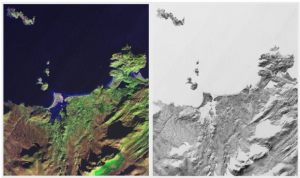GeoCover Images: Difference between revisions
No edit summary |
No edit summary |
||
| Line 1: | Line 1: | ||
[[File:GeoCover_SampleIreland.png|right|thumb|300px|GeoCover Data - Site in Ireland]]Many of the free satellite photos come from the Landsat Series of Satellites, where the images of an area are not recorded in true colors. The satellite carries a camera instrument that records images of the Earth using different filters (wave lengths). The Landsat TM (thematic mapper) instrument on Landsat 5 used seven different bands, each sensible to the different parts of the reflected solar energy. It is possible to convert individual bands into either true color pictures or artificial (false) colour pictures. The option of using artificial color pictures are widely used within the field of remote sensing, when studying e.g. changes in global vegetation, pollution etc. | [[File:GeoCover_SampleIreland.png|right|thumb|300px|GeoCover Data - Site in Ireland]]Many of the free satellite photos come from the Landsat Series of Satellites, where the images of an area are not recorded in true colors. The satellite carries a camera instrument that records images of the Earth using different filters (wave lengths). The Landsat TM (thematic mapper) instrument on Landsat 5 used seven different bands, each sensible to the different parts of the reflected solar energy. It is possible to convert individual bands into either true color pictures or artificial (false) colour pictures. The option of using artificial color pictures are widely used within the field of remote sensing, when studying e.g. changes in global vegetation, pollution etc. | ||
For the GeoCover dataset, these satellite images are based on the US GeoCover database. The image is a mosaic based on data from three spectral bands from the Landsat TM mission: The mid-infrared light which is displayed as red (Band 7), a near-infrared light which is displayed as green (Band 4) and visible green light (band 2) which is displayed as blue | For the GeoCover dataset, these satellite images are based on the US GeoCover database. The image is a mosaic based on data from three spectral bands from the Landsat TM mission: The mid-infrared light which is displayed as red (Band 7), a near-infrared light which is displayed as green (Band 4) and visible green light (band 2) which is displayed as blue. | ||
== Resolution == | |||
The maximal spatial resolution is 14.25 m per pixel. Most data is from the period 1997-2003. | |||
== Coverage == | |||
The GeoCover dataset covers most of the globe except Antarctica. | |||
== External Links | |||
You may find more information about this dataset at the following internet addresses: | You may find more information about this dataset at the following internet addresses: | ||
* https://zulu.ssc.nasa.gov/mrsid/ or | * https://zulu.ssc.nasa.gov/mrsid/ or | ||
* http://glcf.umiacs.umd.edu/data/landsat/ | * http://glcf.umiacs.umd.edu/data/landsat/. | ||
Revision as of 23:14, 26 May 2013

Many of the free satellite photos come from the Landsat Series of Satellites, where the images of an area are not recorded in true colors. The satellite carries a camera instrument that records images of the Earth using different filters (wave lengths). The Landsat TM (thematic mapper) instrument on Landsat 5 used seven different bands, each sensible to the different parts of the reflected solar energy. It is possible to convert individual bands into either true color pictures or artificial (false) colour pictures. The option of using artificial color pictures are widely used within the field of remote sensing, when studying e.g. changes in global vegetation, pollution etc.
For the GeoCover dataset, these satellite images are based on the US GeoCover database. The image is a mosaic based on data from three spectral bands from the Landsat TM mission: The mid-infrared light which is displayed as red (Band 7), a near-infrared light which is displayed as green (Band 4) and visible green light (band 2) which is displayed as blue.
Resolution
The maximal spatial resolution is 14.25 m per pixel. Most data is from the period 1997-2003.
Coverage
The GeoCover dataset covers most of the globe except Antarctica.
== External Links You may find more information about this dataset at the following internet addresses: